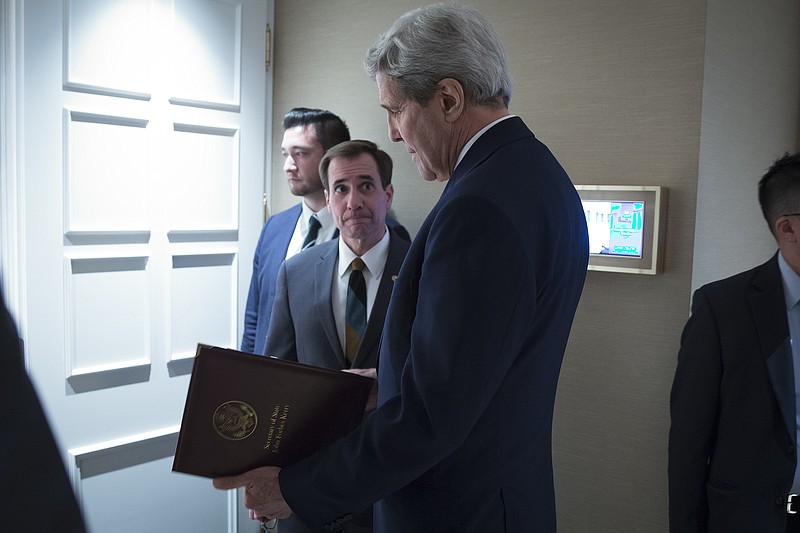Was $400 million that belonged to Iran a ransom for American prisoners in Iran?
Or was it insurance - "leverage," as State Department spokesman John Kirby put it?
Seems to us it was neither. It was more like brilliant negotiation.
Yet only in this ridiculous campaign season would GOP candidates and their supporters tie themselves up in knots over exactly how Americans held prisoner in Iran came to be released.
A U.S. plane filled with $400 million in cash belonging to Iran that had been frozen and held in the U.S. for decades was held up a little longer on its journey back to Iran last January because the State Department officials wanted to use it as "leverage" to ensure that four American prisoners were in fact released by Tehran after concern grew that Iran would not come through on its agreement to let them go.
Kirby insisted the money was not a quid pro quo for the hostage release, explaining that Tehran ultimately would have received the money, separate from the prisoner release.
"First of all, this was Iran's money," Kirby told CNN. "It was money that was awarded to them by the Hague tribunal and it was a process that had been working independently for many months prior to that."
He continued, "But when the lines all came together, right there in January in a very short 24-hour or so period, it would have been foolish, we believe, for us not to hold on just a little bit longer to make sure that we had the right leverage to get those Americans out and that was the priority."
Earlier this month, President Barack Obama called GOP claims that the U.S. was paying "ransom" for the prisoners just a conspiracy theory, and he reminded reporters that his administration had announced the planned $400 million payment - part of a $1.7 billion settlement of lengthy financial dispute between the U.S. and Iran over a failed arms deal from the 1970s - in January when the U.S. was talking with Iran for the first time in decades also to achieve the nuclear deal.
The U.S. agreed to the $1.7 billion settlement because attorneys and advisers were making it clear that a full tribunal - a court case set in motion by former President Ronald Reagan - could mean America might end up paying as much as $10 billion, according to both Obama and Hillary Mann Leverett, a former U.S. negotiator with Iran from the George W. Bush administration.
Leverett on Friday told MSNBC's Stephanie Ruhle she does not see the transaction as ransom.
"In a lot of ways this is really a brilliant, masterful feat of diplomacy. They peacefully resolved a crisis situation with a country with which we've been in a cold war and sometimes a hot war for 35 years," she said. "We got a bargain and we peacefully resolved a dispute that could have ended very badly," Leverett said.
Obama and other state officials have said all three negotiations - the resolution of the financial dispute, the Iran nuclear deal and the prisoner release were all handled separately, though all were happening at the same time.
"We do not pay ransom for hostages," Obama said in early August when the timing question first arose. "We didn't here, and we won't in the future, precisely because if we did we'd start encouraging Americans to be targeted."
This week, however, the administration has been juggling the semantics of saying there was "no link" between the money's release and the prisoners' release. Finally on Thursday, an administration official told CNN the timing of the money's final release was deliberate and shrewd.
"With concerns Iran may renege on the prisoner release given unnecessary delays regarding persons in Iran who could not be located, as well as mutual mistrust between Iran and the United States, we of course sought to retain maximum leverage until after American citizens were released - our top priority," the official said.
Leverett thinks the Obama administration should be touting this as a diplomatic victory. But she also understands politics.
Because Iran is so vilified in American domestic politics, she said, the Obama administration seems reticent to admit any normal transactions with Iran - especially in an election year. She said she thinks the president may be taking one for the team - even at the risk of diminishing his own legacy.
Leverett thinks Hillary Clinton would have taken a harder line with Iran, and perhaps Obama is not taking victory laps in order to give Clinton "space" from a decision or two she might have made differently.
Either way, Americans have come home, we taxpayers saved more than $8 billion on a Ronald Reagan debt and Iran still can't make a nuclear bomb.
Sounds like a win/win/win here.
